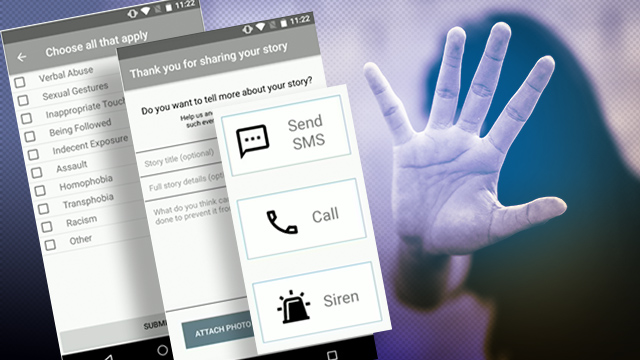
MANILA, Philippines – Unwanted, unwelcome, uninvited: these are 3 words that describe sexual harassment.
While there are policies that penalize sexual harassment in public spaces, cases are still underreported.
In a roundtable discussion with Rappler on Wednesday, January 30, senior high school student Jocilyn Follero recounted her first experience of sexual harassment. A guy who was courting her tried to kiss her without her consent. Being a person with disability, she couldn't escape the boy's advances. (READ: The many faces of sexual harassment)
"Wala akong lakas ng loob para mag-report kasi malayo ang area namin sa police station.... Hindi ako makatakbo kasi nakasaklay ako.... Ngayon binilisan ko ang lakad ko. Ang problema, hinabol niya ako hanggang sa maabutan niya ako. 'Yun po, nalapatan niya po ang lips ko ng labi niya," she recalled.
(I didn't have the guts to report the incident because our area is far from the police station.... I couldn't run because I was on crutches.... I just quickened my pace. The problem was, he ran after me until he caught up to me. That's when his lips touched mine.)
Like Follero, other victims may struggle to report incidents to authorities since there may not be mechanisms in place to make the process easier and safer for them.
Half the battle
While the Philippines has the Anti-Sexual Harassment Act of 1995, this law only covers work-related and school-related harassment.
In May 2016, Quezon City took the first step to safer spaces through its Anti-Catcalling Ordinance, which prohibits sexual harassment in public spaces. Violators in the city would face penalties and fees according to the degree of the offense. (READ: The streets that haunt Filipino women)
Catcalling and whistling can warrant imprisonment or a fine of P1,000 to P5,000. More severe violations can merit time behind bars for a month to a year and a fine of P3,000 to P5,000.
"We want to properly handle reports and cases of public space sexual harassment and see how we are able to push forward the issue of women having the strength or courage to really come forward and even pursue a case of public space sexual harassment," said Quezon City Administrator Aldrin Cuña.
Even with policies in place, victims of sexual harassment may still feel uncomfortable reporting their experiences.
"We have this observation that, yes, the policy is in place but not many women really report their cases. Many of them would make a phone call inquiring or asking if this is sexual harassment.... In terms of actually filing it at the police station, we see very limited number of cases being recorded," said Charisse Jordan, the national project officer of United Nations (UN) Safe Cities in Metro Manila.
Aside from public policies, there also has to be a community effort to create an environment that encourages women to report incidents of sexual harassment.
"If women or girls do not feel safe to report, then that is [what] we should really work on together as a community. Again, it takes the whole village to make the community safe.... We need everyone to be an active bystander," added Jordan.
Other ways
Those who have experienced sexual harassment may report to the women's desk of the nearest police station. However, there are other ways to make reporting easier, especially for those who might find it difficult to speak up.
Clau Yagyagan created DLOCK, an application that allows users to message or call an emergency contact, and ring a siren, even when their screen is locked. It also features a directory of police stations, hospitals, and fire stations in specific cities. It won in UN Women's #SafeCities Hackathon in 2016.
Through the app, people can report an incident, either as a victim or as a witness. The matter would then be turned over to the authorities.
UN Women is studying how the reports can go straight to a command center for immediate action and response.
"That's why we work with local governments such as Quezon City, because we want this app to be maximized and be integrated in the data collection and database of the city," said Jordan.
Roselle Rivera, an associate professor at the University of the Philippines Diliman's College of Social Work and Community Development, stressed that the solution goes beyond public policy. Community awareness and action are key as well.
"That's the important thing: That people have the knowledge of their rights," said Rivera.
Jordan also emphasized: "It is your right to report sexual harassment. It is your right to share your story when you feel violated. It is your right to be supported and to be provided with the remedies." – Rappler.com